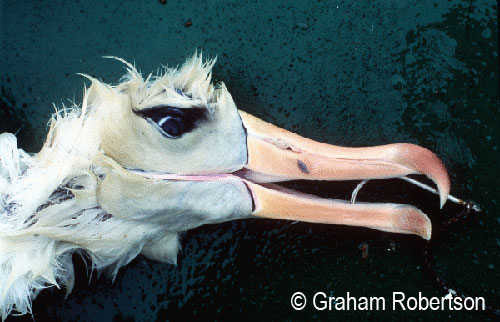In November last year the UK Environment Minister Richard Benyon announced funding of UK£30 000 towards a BirdLife International project to undertake at-sea trials of hook pods in South Africa to reduce seabird bycatch in pelagic long-line fisheries, at a meeting of the UK Overseas Territories Consultative Council.
The goal of the project is to apply innovative and pioneering technology to reduce seabird (and potentially turtle) bycatch in global pelagic longline fisheries by widespread adoption of an innovative pressure release mechanism.
The development of the ‘Hook Pod' is a joint project between Fishtek and BirdLife International. The project commenced in 2007 with the design and development of a prototype Hook Pod to reduce seabird bycatch in pelagic longline fishing. Initial at-sea trials and discussions with fishers lead to the development of a small unit that protects the point and barb of the hook. The Hook Pod includes a brass weight to maximise the sink rate of baited hooks, therefore removing hooks from the danger zone (10-m depth) of plunging and diving seabirds as rapidly as possible.
The spring-loaded release mechanism of the Hook Pod can be adjusted to open at any required depth. Flume-tank trials have shown the device is robust and would function to depths of 1000 m, far deeper than pelagic longline fishing operations.
Many pelagic longline fisheries use disposable chemical light sticks, which are recognised as a major source of marine pollution. Not only does the discarding of millions of light sticks into the world's oceans each year constitute a major environmental problem, but it is also very costly to fishes. The Hook Pod will incorporate a LED, which will remove the need for disposable light sticks and make the economics of the pod more attractive.
Trials have been conducted to test various pressure-release mechanisms and to ensure the Hook Pods fit with standard fishing practices during setting, hauling and line storage. In trials conducted last year in Brazil's tuna longline fishery, hook pods were correctly deployed on 95% of lines and opened and released the hook correctly within ±1 m of the target depth.
It is now proposed to conduct further trials in South African-controlled pelagic longline fisheries during the course of 2012.
.
Click here for an earlier news item on the hook pod trials in Brazil
Black-browed Albatross drowned on a conventional longline hook
Click here for news of another grant made by Minister Benyon at the same meeting to help rid Gough Island of its killer mice.
With thanks to Stacey Hughes, CITES & International Species Policy Team, Department for Environment, Food and Rural Affairs, UK and Ben Sullivan, Royal Society for the Protection of Birds, UK for information.
John Cooper, ACAP Information Officer, 5 February 2012, updated 7 February 2012

 English
English  Français
Français  Español
Español